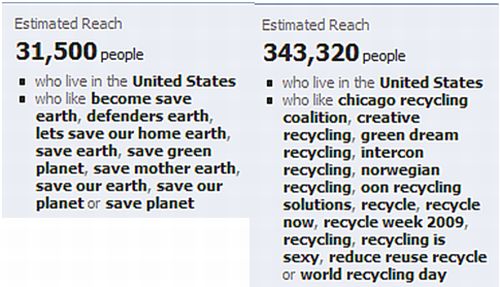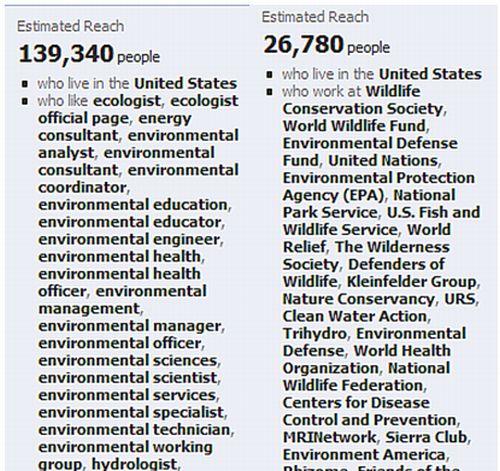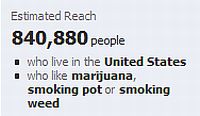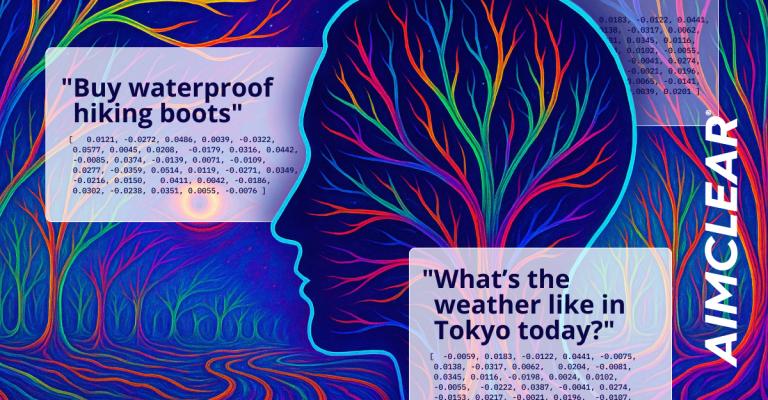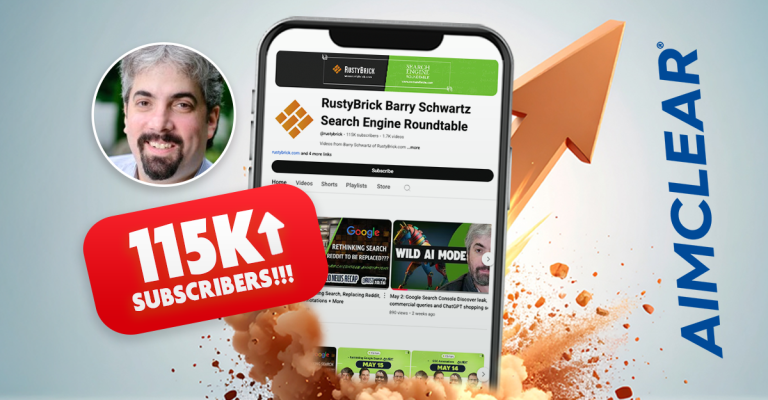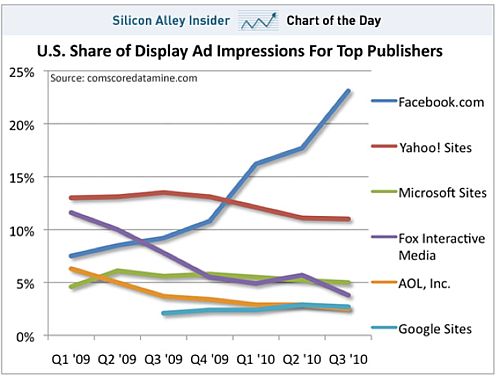
Compliments of Silicon Alley Insider’s Chart of the Day, it’s pretty clear to see that Facebook Advertising has skyrocketed past the old standby advertising platforms of Google, AOL, Yahoo and the like in terms of ad impressions in the US. Advertising on Facebook is a serious weapon for online marketers, yet many are halted by the first all-too-important step: keyword research. Top tactics for building out FB keyword buckets and a look at how to amplify ad targeting by leveraging social synonyms lives below the fold.
We’ve long advocated for keyword segments to be mapped to search keywords directly inside Facebook campaigns, but the savvy marketer cannot stop there. Imagine the Nissan Leaf marketing team mapping their search campaign to social. Nissan enthusiasts exist in a decent chunk on Facebook, but there are few explicitly interested in electric cars or hybrids. Likewise, marketers will be hard-pressed to find users “interested” in “best mgp.” But rest assured, they’re around.
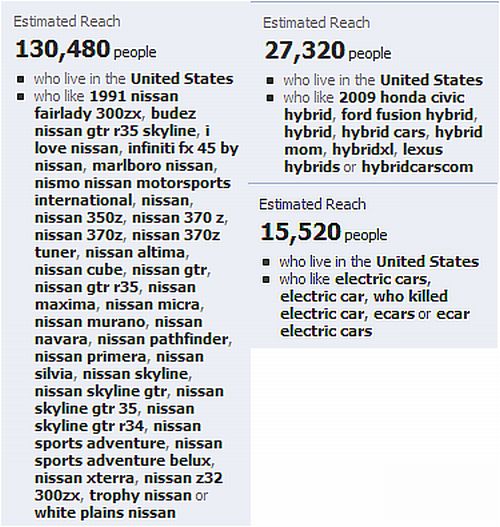
Facebook Campaigns can & should be taken further by taking how Facebook Ads are targeted into consideration.
Here’s what Facebook tells advertisers:
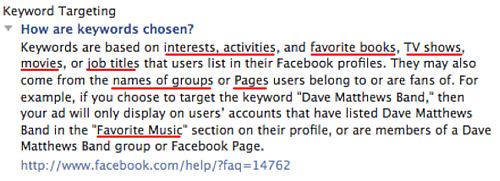
Compare that to what they tell the average user:
While we’re not quite sure what “more content on your profile” means, this snippet illustrates one very important factor: that Facebook advertising is clearly a different animal from search PPC. Unlike traditional PPC, Facebook users aren’t actively (deliberately) searching for a particular keyword that then returns ads related to the query. The twisted-beauty of Facebook is that marketers have an intimate glimpse into users’ interests– or, at least, the reach of said interests. Understanding this concept is fundamental as you set out for the social synonym hunt.
Returning to our Nissan instance, the Leaf’s marketing team would next hopefully ask questions such as: “What would someone who would buy an electric car disclose about themselves on Facebook?” and, “Where would their affinities lie?” and, “What do they stand up for?” and, “What are they proud of?” Answers to these questions will build the web of social synonyms.
For example, consumers who are most likely to buy an electric car presumably care deeply about the environment. A fine place to start:

This one bucket has encompasses 150K and change. Not bad. That’s bigger than the direct “Nissan” interest group. The next step is to uncover the social synonyms for this new segment. But where to begin? Back at the basics. Never underestimate the total badass power of the good old printed & bound Thesaurus.
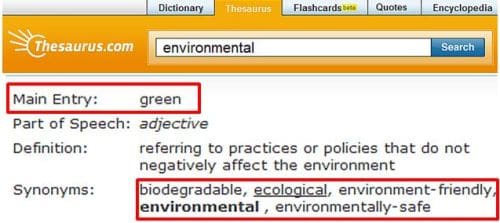
Drill into the synonyms provided by the Thesaurus. Plug them into Facebook. Divide them into new, tightly-focused segments– this will allow you to call out to Facebookers using the same vernacular they use on their profile: “Go Green with Leaf” will resonate differently than “Leaf: Most Environmentally Friendly!” depending on who you’re targeting.
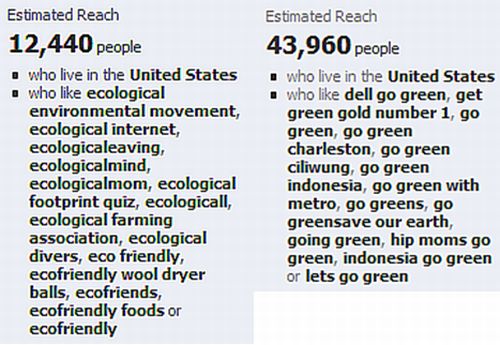
Brainstorm further around these terms. “Recycling” is definitely a part of “going green,” and these people charge themselves with “saving the planet” or “saving earth.”
Wikipedia: A Peer-Edited Gold Mine
Wikipedia is a powerhouse tool for social synonyms, especially if you’re at a loss of where to start. From “Environmental Movement,” we find terms such as “conservation,” “sustainability” in addition to overlap.

Be warned: it’s fully possible to lose an entire day following the links from one Wikipedia article to another in search of new social synonyms.
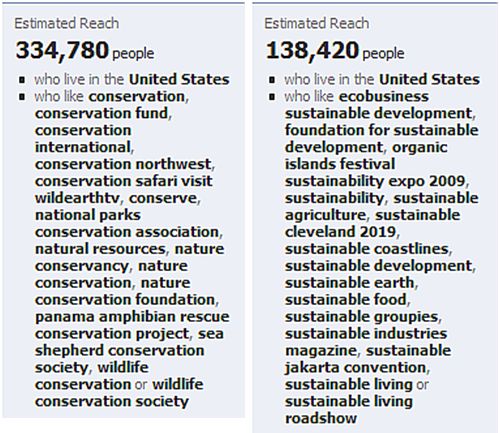
Solutions for “conservation” & “sustainable living” include alternative sources of energy. Follow the logic.
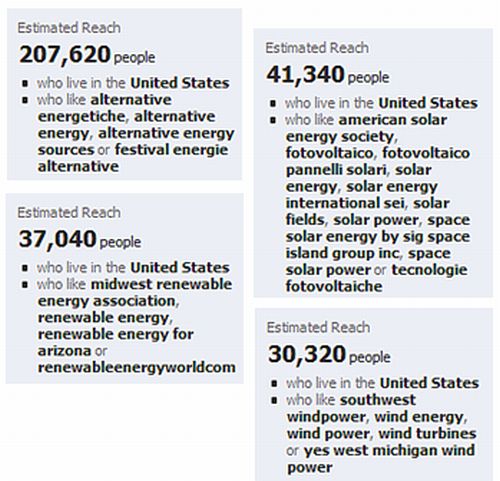
When the Prius first came out many owners were slapped with the tree-hugger hippie label. A marketer could assume the same for an electric car, such as the Leaf. What’s wrong with being a hippie or treehugger? Nothing. They’re usually passionate & enthusiastic about their causes, and the products that facilitate them. Find the people on Facebook who are proud of that label and rock their worlds 🙂 .
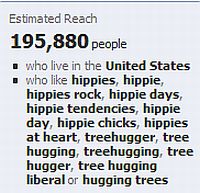
Wow. Nearly 200K users on Facebook in the US alone are proud card-carrying hippies or tree-huggers. That’s a heck of a lot more than those just interested in the direct Nissan brand terms, and arguably equally (or even more) relevant.
Following that “personal label” train of thought… identify people charged with caring for the environment as their profession and the obvious workplaces:
Go back to your Hippie/Treehugger segment. It’s not easy to glean their place of employment (though just about everyone who works at our local Whole Foods would align with hippie ideals or conservation). Worth a try.
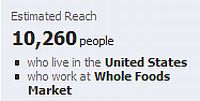
Another way to expand social synonyms is to consider what is asked of users upon completing their Facebook profiles. Under the “Interests” umbrella dwells criteria including favorite books, TV shows & movies. In this case, Amazon’s suggestions is your pal.


The hard reality, dear marketers, is if you are not expanding in Facebook using social synonyms, you are missing out on some serious, highly-targeted niche segments.
Please accept this last, final Easter Egg to demonstrate the awesome power of social synonyms:
Um. That’s nearly 1 million people in the US who freely admit they dance with Mary Jane. What could you sell this crowd? Chips, chocolate, Pink Floyd’s The Wall? Hell, Disney could probably sell them Fantasia.

But if you were to stop there, without expanding to all your social synonyms, look at what you’d be missing:

Over 3/4 of the potential market.
Party on, Wayne.

